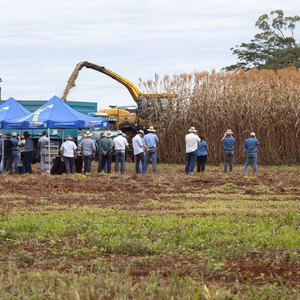NexSteppe raises $22 million in series C financing

NexSteppe
September 25, 2014
BY NexSteppe
NexSteppe, a company dedicated to delivering the next generation of sustainable feedstock solutions for the biobased industries, recently announced it has raised $22 million in its third round of funding.
NexSteppe is a seed company focused on developing crops that provide optimized raw materials for biofuels, biopower and biobased products. Sugars and biomass from NexSteppe’s tailored crops can be processed by biomass boilers, anaerobic digesters and biorefineries into a myriad of products from power and electricity to first and second generation biofuels to plastics and chemical intermediates.
The biobased industries are experiencing rapid growth driven by increasing energy demand, a desire for energy security, volatile fossil fuel prices, and concerns about the environmental impacts of fossil fuel use. In order to maintain this growth, these industries need scalable, reliable and sustainable feedstocks that won’t negatively impact the environment or the world’s food supply. This need is particularly clear as we see the first wave of commercial-scale, cellulosic biorefineries beginning operations in the U.S. NexSteppe’s products, optimized for these applications, will allow bioenergy and biobased products to become mainstream, largescale, sustainable solutions.
Advertisement
Advertisement
The company will use the proceeds from the round to continue to improve its industry-leading Palo Alto biomass sorghum and Malibu sweet sorghum product lines, already available to customers in Brazil and the U.S., as well as to launch additional product lines and expand its market development efforts around the world. According to NexSteppe founder and CEO, Anna Rath, “NexSteppe has already demonstrated itself as the market leader in dedicated biomass crops. We now look forward to rapidly achieving a level of scale and global presence that will make these crops a reliable, bankable feedstock solution for all biobased industries throughout the globe.”
In the new round of funding, new investors Total Energy Ventures and ELFH Holding GmbH, a vehicle of the Berninghausen family in Germany, a serial founder and investor in cleantech, the wood industry and real estate, join existing investors Braemar Energy Ventures, CYM Ventures, DuPont Ventures and others.
Advertisement
Advertisement
Total is actively involved in the development of innovative solutions to produce biofuels and bioproducts through research and development programs, industrial developments and participations in various companies or startups, and Total’s objective is to increase the use of feedstock avoiding competition with food. “Availability of feedstock on a sustainable basis will be critical for the development of the biobased industries and we believe that NexSteppe will be a leader in providing the requested feedstock. We are also confident that by working together, Total and NexSteppe will each get a better understanding of the whole supply chain,” said Francois Badoual, CEO of Total Energy Ventures.
“DuPont is pleased that our collaboration with NexSteppe has helped them achieve their first commercial sales for more sustainable feedstocks in the United States and Brazil,” said Michael Blaustein, director DuPont Ventures. “As a science company, we believe that collaborations with new ventures such as these are an important part of helping bring cutting edge science to market.”
Related Stories
The U.S Department of Energy Bioenergy Technologies Office, in partnership with the Algae Foundation and NREL, on July 21 announced the grand champion and top four winning teams of the 2023 - 2025 U.S. DOE AlgaePrize Competition.
The USDA significantly increased its estimate for 2025-’26 soybean oil use in biofuel production in its latest World Agricultural Supply and Demand Estimates report, released July 11. The outlook for soybean production was revised down.
U.S. fuel ethanol capacity fell slightly in April, while biodiesel and renewable diesel capacity held steady, according to data released by the U.S. EIA on June 30. Feedstock consumption was down when compared to the previous month.
The U.S. EPA on July 8 hosted virtual public hearing to gather input on the agency’s recently released proposed rule to set 2026 and 2027 RFS RVOs. Members of the biofuel industry were among those to offer testimony during the event.
The USDA’s Risk Management Agency is implementing multiple changes to the Camelina pilot insurance program for the 2026 and succeeding crop years. The changes will expand coverage options and provide greater flexibility for producers.
Upcoming Events










